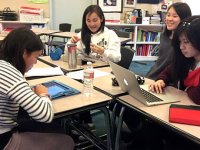5 Epiphanies on Learning in a 1:1 iPad Classroom
Last fall, my high school handed iPads to each student in the building, and I began my journey as the school's Instructional Technology Coach. Since our faculty had spent the previous year preparing for the rollout, I knew our classroom environment and teaching methods would evolve. I welcomed it. But I could never have imagined how vast -- and rewarding -- that evolution would be.
To provide some structure for my journey, I joined a cross-curricular group of my colleagues who were focusing on action research in their classrooms. Questions permeate good action research -- mine was: "What does learning look like in a fully-committed 1:1 iPad high school classroom?" I gathered data from my three freshman English classes throughout the year while we engaged in a rich, ongoing cycle of experimentation, feedback, and discussion.
As an English teacher, I use the word "epiphany" all the time. But this year I came to understand that term on a more personal level -- not just once, but again and again. The following are a few of the most meaningful epiphanies that I experienced.
Epiphany #1: Students Should Be Partners in Action Research
Because I was as much a learner this year as my students, I was even more transparent than usual with them about my methods and purpose. Our rich cycle of experimentation and feedback provided a wealth of data, but more importantly, my 13- and 14-year-old students became far more confident as learners, self-advocates, and problem solvers than I had seen the previous year.
This growth was particularly visible in the results of my end-of-the-year technology survey. One hundred percent of the feedback I received was constructive, thoughtful, insightful, and serious. Not one of my students blew it off or used the survey as an opportunity to complain or bemoan a personal issue. As any high school teacher will agree, this seems a miracle.
Epiphany #2: Organization Is Inherently Tied to Learning
I expected my students to be most drawn to creative tools or games on the iPad. And although they enjoyed many of these, it turns out that Schoology, (a learning management system) and Notability (a note-taking and annotation app) were by far my students' most frequently-used and appreciated apps.
Is this because Schoology and Notability have some magic that other tools don't? Not at all. Rather, my students said that their learning improved because, in my paperless class, everything they needed was on their iPads, so they stayed more organized and felt more in control of their learning.
And here’s the kicker. Students began using Schoology to ask and answer each other's questions before I even saw them. By the second semester, I was answering far fewer "unnecessary" questions and had more time to spend on what they really needed to know. This alone was worth its weight in gold.
Epiphany #3: Assessments Can Be Both Fun and Effective
As I began a unit on Homer's The Odyssey, my principal told me about a free online tool called Kahoot!, which allows teachers to create quizzes that run like a game show using iDevices as the clickers. I wondered, "What would happen if I used this tool to assess students' comprehension of the text instead of using traditional reading quizzes?"
We had eight games throughout the unit. Each time, students poured into the room, fizzing with excitement and quizzing each other about the reading. The timed questions were punctuated with groans and cheers, followed by proud yells from students who found themselves on the leaderboard.
When was the last time you saw a traditional reading quiz have this effect on a class?
Yet it wasn't just a game. Using a graph provided at the end of each question, I could immediately assess and correct student understanding as needed. After the game, I was also able to download a spreadsheet containing each student's answers so that I could follow up with individuals who struggled.
And really, isn't that what good formative assessment is all about?
Epiphany #4: Digital Tools Can Improve the Writing Process and Final Product
I know there is no magic tool that will grade essays for me. But I wondered, "What would happen if I went paperless with essays? Can I improve both my process and student learning?"
To the joy of my English teacher heart, going paperless allowed me to add extra rounds of drafting, peer review, and revision for students -- essential parts of good writing process that can be difficult to include due to time constraints. I was also able to provide timely narrative feedback on both rough drafts and final essays. And I did all of this within the same two weeks I used last year, without adding extra grading time.
More importantly, almost all my students felt better about their writing process and final drafts. And I was also thrilled to discover that their final essays were of higher quality.
Epiphany #5: I'm (Gladly) Not Done Yet!
Good teaching requires continuous flexibility, innovation, experimentation, data gathering, data crunching, and reevaluation. And even when I believe that I've answered one question, another rises in its place. Discouraging? Not in the slightest. Invigorating, inspiring, and energizing? Absolutely.
Have you had any 1:1 experiences that you'd label as epiphanies? Please tell us about them in the comments below.
